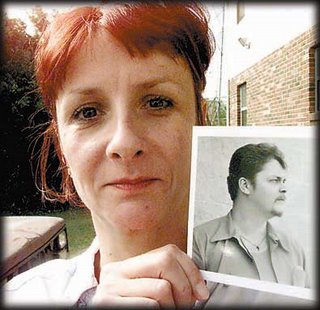Death penalty
 I was asked to talk about my correspondence with the past Jeffrey Bannister the next Monday to some 9th graders here in Turku, Finland. Who was this man, Jeffrey Bannister? If you ask from me, Alan Jeffrey Bannister from Missouri, U.S., was a victim of a terrible injustice (read: absolutely awful politics) who was executed with lethal injection on October 22nd 1997 CE by the state of Missouri.
I was asked to talk about my correspondence with the past Jeffrey Bannister the next Monday to some 9th graders here in Turku, Finland. Who was this man, Jeffrey Bannister? If you ask from me, Alan Jeffrey Bannister from Missouri, U.S., was a victim of a terrible injustice (read: absolutely awful politics) who was executed with lethal injection on October 22nd 1997 CE by the state of Missouri.I started correspondence with past Mr. Bannister soon after seeing the British documentary Raising Hell. I was truly shocked about the case. The stereotypical thought of a pathologically sick and wicked murderer just didn't match with Mr. Bannister. He seemed to me more like a person with an awfully bad social background and bad luck (in his case maybe especially under local U.S. elections). The more I started to study the subject and the general statistics and facts a pretty general pattern of injustice started forcefully to surface. The subject started to stink really awfully. It made me feel sick. The United Nations have lots to say about this subject in the case you are interested. And let me make it clear, this is a more universal problem, not just a problem of the United States. Statistics speak for themself.
The left hand path is often associated with a fiercely revengeful approach in certain dimensions of ethics. When it comes to the trancendental branch of the path, I think there are much more thoughful variations in many ways here. I want to be known as one of those exceptions to this stereotypical view of travelers of the path as strictly revengeful in their approach to the subject of death penalty.
In general, I am strongly against death penalty. There are some conditions that I see as exceptions to my general views on the subject, but they are rare. If you ask from me, you can flush Anton LaVey's points about "just hitting back" as fast down the toilet as you can flush the stereotypical Christian points of "turning the other cheek"-view. From my general point of view, they are both very simplistic and thus in their practical use in complex conditions often also pretty stupid views. Hitting back is most likely very smart for self-defence in extreme situations, but if hitting back is systematically used by a society it is another thing. Structural violence has never brought too good results anywhere.
I am curious about my blog's readers points of view on the subject. Are you pro or con regarding death penalty? Why this or that way? And in what conditions? In what conditions you would be ready to kill a person in the name of revenge or justice?
Be prideful and thoughtful of Being and in the name of the Highest of Life.


7 Comments:
The problem that I have with the death penalty is exemplified by the tragedy of Mr. Bannister.
It is not a fairly and equally applied sanction. It appears that individuals (at least here in the USA) who happen to be poor (cannot afford adaqaute legal representation), mentally-ill or other victims of bias due to their race, color or creed are more likely to be sentenced to this fate.
On the other hand, those who are more affluent, who have the correct politics, background and skin color, etc are less likely to be punished in this manner.
It has always seemed to me that depriving someone of their freedom and confining them to a 3 foot by 9 foot cell and having every move monitored and controlled for the rest of their lives is a far more draconian punishment.
Since it is drawn out over many decades in capital crimes, the crminal's realization that they will never draw another breath of air as a free individual would be overwhelming and omnipresent.
Dear Tapio,
here is my two cents worth comment.
To be honest, this is not a topic that interests me a great deal (at the moment) and I don’t lose my good night’s sleep if someone is sentenced to death row in the United States or elsewhere. Since there is no death penalty in Finland, this is just a speculation on my part.
I am not entirely against the death penalty. Personally I don't believe that nobody should be executed for anything. It is not against my principles if real murderers, rapists, pedophiles and others guilty of very serious crimes are sentenced to death.
I can’t be sure, but I suppose there are very few people who would think otherwise, if something horrible would happen to their family members, loved ones and close friends. And in such a terrible case, it certainly wouldn't satisfy my sense of justice to see the killer simply being sentenced behind bars. Whether or not they could somehow "pay back their debt to society" through work, etc. is hardly relevant for relatives of the victims (nor to the victims themselves).
On a more black-humorous note, I might add that we still do have a problem with overpopulation...
My opinion on the matter is most likely based more on instinctive sense of fairness than on any thoughtful ethical stance; that's why I offer here only very simple, seemingly black 'n' white answers.
I vote nay on capital punishment.
It's simply inhuman.
I can understand other viewpoints, but the idea that _I_ would be killed because of something I may or may not have done -- and let some random jury decide on that -- is enough to say nay.
Dear all,
thank you for your thoughtful comments.
This subject certainly has many aspects in it to consider.
As I mentioned earlier, my general approach is strongly against death penalty but I think there are cases when I would find it acceptable. Akenanubis wrote about some such cases and I understand well Ensio's point of view too. To me these are very much a matter of case-by-case evaluations.
Something that often troubles me with the subject is that it looks like that such an ultimate and final sentence is way too often given to people who have later been found not guilty. It also looks like that the more you have status and power in society the more certainly you can save yourself from death penalty although the crimes done on those levels can often be arguably of such nature to society at large that death penalty could then be considered for them too. It also seems that the more lower status one has, the more easily one can get death penalty for crimes done. Is this justice?
Also, the number of people waiting their execution makes me think about social conditions and structures that seem to continue to maintain the culture where certain kind of individuals end up in death row. What could and should be done to structurally weaken conditions where such multi-level tragedies emerge? Evidently death penalty is not working as a deterrent for many awful crimes. It is good to think about how structure and many elements of society contribute to the tragic conditions involved here.
Wooki - I don't remember LaVey's views on death penalty, I referred to him only because of his famous 5th satanic statement ("Satan represents vengeance, instead of turning the other cheek!") and what it generally seems to imply in this context.
This all reminds me about the nature of ethical questions. Sometimes we agree clearly on things (and then there is no ethical problem - then we simply agree that something is morally wrong or right), oftentimes not. As beings capable of considering many aspects of ethical problems it would be irresponsible (from my point of view) to just go with the flow of the mainstream opinions, attitudes and habits. I am not expecting humans to agree with each other on several things, but I do hope they would be a bit more willing to ponder difficult questions from several sides.
Reading for the day: Glenn Tinder: _Political Thinking_.
I have witnessed first hand on more than one occassion the miscarriage of justice. So much so that I went back to school to understand why/how such events occur. Aside from the usual race/social status and monetary abilities of individuals to remain free of suposed justice it is my informed and experienced opinion that no one gets away with anything that is hardwired as a crime in their minds. After many years of observing those who trespassed and attempted to usurp life from myself and family I can say that freedom exists only in those whose minds are free. When beings attempt to acquire their freedom at the expense of others they are not free and cannot Know freedom, hence their self imposed sentence of forced ignorance and the illusory ability to recycle that ignorance. If those individuals have connected themselves to me then I have just as much access to them if not more than they to me and that has proved a most rewarding experience.
Does it matter that people die? I dont think so. It is tragic in some cases but that is the nature we must live with. Can it judged affectively? I think we do our best as a society but fall way short of our true abilities.
Nu Rex
I am not completely against the death penalty, but I am against the justice system that decides who gets the capital punishment and who doesn't. Seems to me that juries mostly base their decision and recommendation of the capital punishment on their own emotional reactions. Now this would be allright if the people involved were highly aware of themselves, but I believe they are chosen by the defense lawyers and prosecution for their probable emotional reactions to the case.
Wooki, you are probably right, the most aware people would probably _very rarely_ condemn anyone to death and if they did, they probably wouldn't lock them up to wait for the day for years.
Aaron, that is really horrible! That sounds even worse than I had expected. The human machines are out there and they make worse decisions than computers. At least it would be impossible to bully a computer to conform.
Post a Comment
<< Home